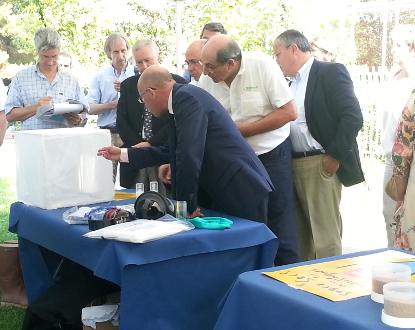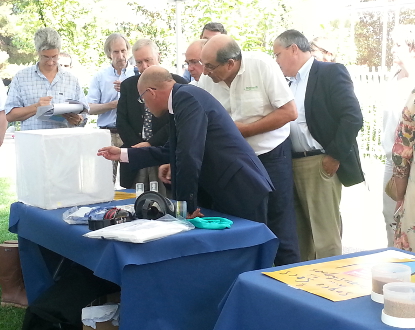Yesterday morning, in Nice, Eric Ciotti, President of the General Council of Alpes-Maritimes, presented the prevention and control measures against epidemic risks linked to the presence of the “Aedes Albopictus” mosquito.
 More commonly known as the Tiger mosquito, Aedes Albopictus is a potential vector insect for pathologies. In tropical zones, it can transmit about thirty viruses, spreading chikungunya, Saint Louis encephalitis, and dengue. “In France, this mosquito has settled in 18 departments. The Alpes-Maritimes is the first department in mainland France to have been durably colonized by the Aedes Albopictus mosquito,” claims Eric Ciotti. “Since 2004, the presence of this insect has been consistently increasing,” he adds. Thus, starting in 2006, in collaboration with the EID (Interdepartmental Agreement for Mosquito Control in the Mediterranean Coast), the General Council has implemented a system, updated annually.
More commonly known as the Tiger mosquito, Aedes Albopictus is a potential vector insect for pathologies. In tropical zones, it can transmit about thirty viruses, spreading chikungunya, Saint Louis encephalitis, and dengue. “In France, this mosquito has settled in 18 departments. The Alpes-Maritimes is the first department in mainland France to have been durably colonized by the Aedes Albopictus mosquito,” claims Eric Ciotti. “Since 2004, the presence of this insect has been consistently increasing,” he adds. Thus, starting in 2006, in collaboration with the EID (Interdepartmental Agreement for Mosquito Control in the Mediterranean Coast), the General Council has implemented a system, updated annually.
In 2014, a budget of 400,000 euros was allocated to the EID by the department.
As part of this fight, a communication and intervention campaign “Be Dry with Mosquitoes” was launched. However, “the risk of an epidemic on the Côte d’Azur remains low, but vigilance and monitoring are essential,” states the President of the General Council.
Bernard Cadiou, head of the EID agency for Alpes-Maritimes, emphasizes a few actions to adopt to avoid mosquito proliferation:
Empty as often as possible the saucers under flower pots, vases, and buckets
Cover water reserves such as cans or watering tanks with mosquito nets or fabric
Regularly maintain ornamental ponds and introduce goldfish, which are fond of larvae
Maintain pools regularly; empty or cover them in the off-season
Empty and turn over garden tools and toys
Clean and maintain clogged gutters and drainage ditches
Regulate the watering of planters. The soil should be moist but with no standing water
Put sand at the bottom of saucers in cemeteries



